Board Certified Behavior Analysts (BCBAs) work in a variety of settings, including:
Each of these roles plays a vital part in improving the lives of individuals with autism and developmental disabilities.
In this article, we’ll explore how BCBAs use their expertise in different environments to create tailored interventions and enhance learning experiences. They also influence public policy, showcasing the versatility and impact of their work across multiple sectors.
Let’s dive in and see how they make a difference together!
Board Certified Behavior Analysts (BCBAs) play a vital role in transforming lives in various settings, from clinics to schools and even corporate spaces. This article takes a closer look at the exciting opportunities available for BCBAs, highlighting how their skills in Applied Behavior Analysis (ABA) can truly enhance the lives of individuals with autism and developmental disabilities.
With a job market projected to grow by 22% over the next decade, it’s natural to wonder: where can a BCBA really make a difference? As we explore this landscape, we’ll uncover not only the versatility of BCBA roles but also the meaningful impact they have on the communities they serve. Let’s dive in together and discover how these professionals are making a difference!
At Rori Care, we understand that navigating ABA therapy can feel overwhelming for parents. That's why our data-driven strategy is designed to tailor each care plan to meet the unique needs of every child. By leveraging advanced technology, like automated data collection tools and analytics software, our clinicians can analyze behavioral data effectively. This helps us make informed decisions that lead to meaningful interventions.
Imagine having a behavior care engine that not only automates progress report creation but also ensures your child's data is securely stored and anonymized. This innovation boosts the efficiency of ABA therapy, giving caregivers an incredible 50% more time to focus on youth care. Our personalized approach aims to foster independence and social skills in children with autism.
Did you know that studies show kids receiving intensive ABA interventions can reduce severe behaviors by as much as 90%? Plus, research indicates an impressive average effect size of 9.02 for language skills. And when it comes to communication, ABA interventions have shown significant improvements, with a standardized mean difference of d=0.30.
Ultimately, this innovative approach can transform the lives of children and their families, paving the way for a brighter future. As one expert put it, 'Data-driven ABA therapy is a systematic, evidence-based approach that uses careful measurement and analysis of behavior to guide intervention decisions.'
Let’s explore this together! We’re here to help you every step of the way!
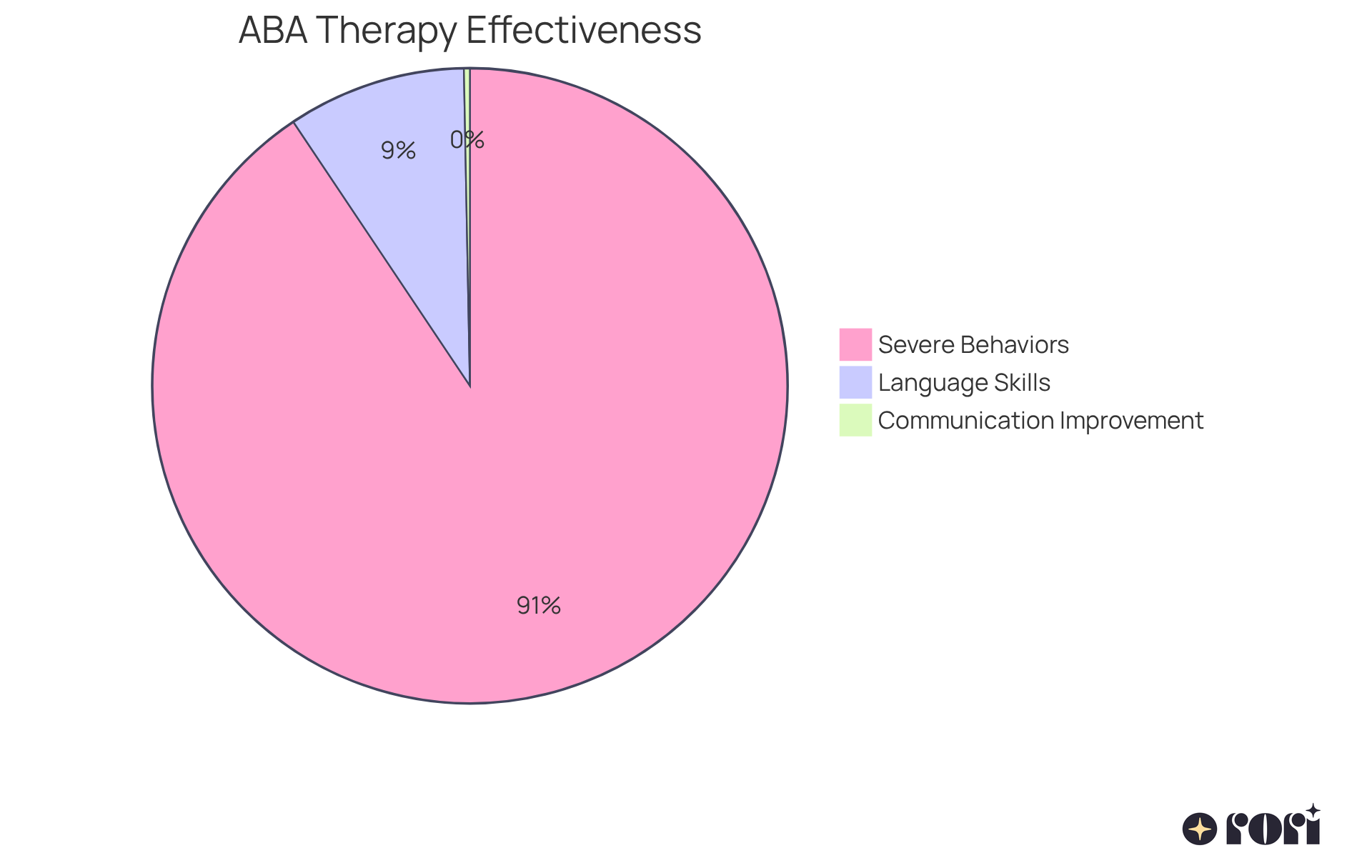
Board Certified Behavior Analysts (BCBAs) play a vital role in clinical practice, focusing on creating personalized treatment plans for individuals with autism and other developmental disabilities. By conducting thorough assessments, they gather important data to track progress and adjust interventions as needed. This tailored approach not only helps clients achieve their specific goals but also greatly improves their quality of life by encouraging positive behaviors and enhancing social interactions.
Did you know that kids who start therapy before age four tend to have better long-term outcomes? Early intervention can lead to significant improvements in communication skills and adaptive behavior. There are countless success stories of how BCBAs have changed lives by customizing care to meet each individual's unique needs, ultimately fostering greater independence and social integration.
Interestingly, individuals with lower initial adaptive levels have shown an average improvement of 4.46 points in their Adaptive Behavior Composite score after 24 months of intensive ABA intervention. However, it’s crucial to recognize that only 15% of insured youths referred for ABA-based behavioral health care received 80% or more of the recommended therapy hours. This highlights the challenges families often face in accessing the support they need.
As specialists emphasize, early identification and intervention are key to improving long-term outcomes for youth with autism. At Rori Care, we’re excited to incorporate advanced AI into ABA therapy, which boosts treatment efficiency and allows for 50% more time dedicated to direct patient care. This innovation not only streamlines the creation of progress reports but also equips caregivers with the knowledge and strategies they need to effectively support their children's behavioral goals.
Ready to explore how personalized ABA therapy can make a difference for your child? Let’s schedule an immediate consultation and take the first step together!
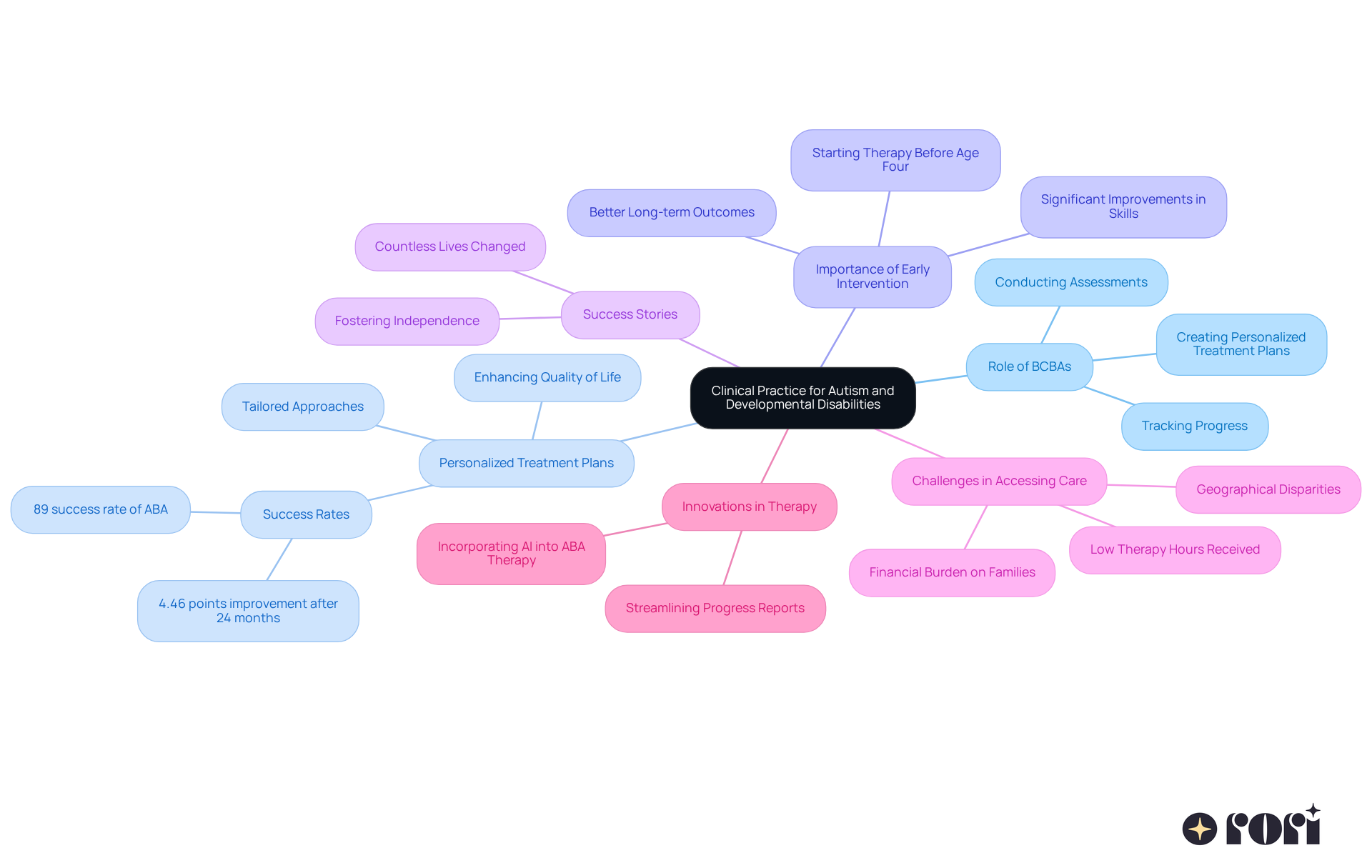
In educational environments, Board Certified Behavior Analysts play a vital role in supporting students with autism. They work closely with teachers and school staff to craft effective behavior intervention plans that are tailored to each student's unique needs. By using evidence-based approaches and personalized planning, they ensure that every behavioral plan addresses the distinct strengths and challenges of the individual.
Establishing clear, measurable objectives is key. This transparency helps both educators and parents track progress, making it easier to celebrate successes along the way! Behavior analysts also provide essential training on effective teaching strategies and classroom management techniques, creating a more inclusive learning environment.
As Kathy Perez wisely noted, 'Empathy can help students become more aware of how their words and actions affect others.' This highlights the importance of understanding students' experiences. By focusing on encouraging positive behavior and boosting student involvement, behavior analysts significantly enhance the educational experience for individuals with developmental disabilities.
Research shows that 'setting clear behavior expectations early is more effective than implementing consequences after difficult behaviors occur.' This proactive approach is what practitioners strive for! Their expertise ensures that interventions are not only effective but also supportive, leading to better academic outcomes and social interactions.
Involving parents in this process is crucial. When families are educated about strategies to reinforce these interventions at home, it enhances support and informed decision-making for their child's development. So, let’s explore this together! We’re here to help you every step of the way!
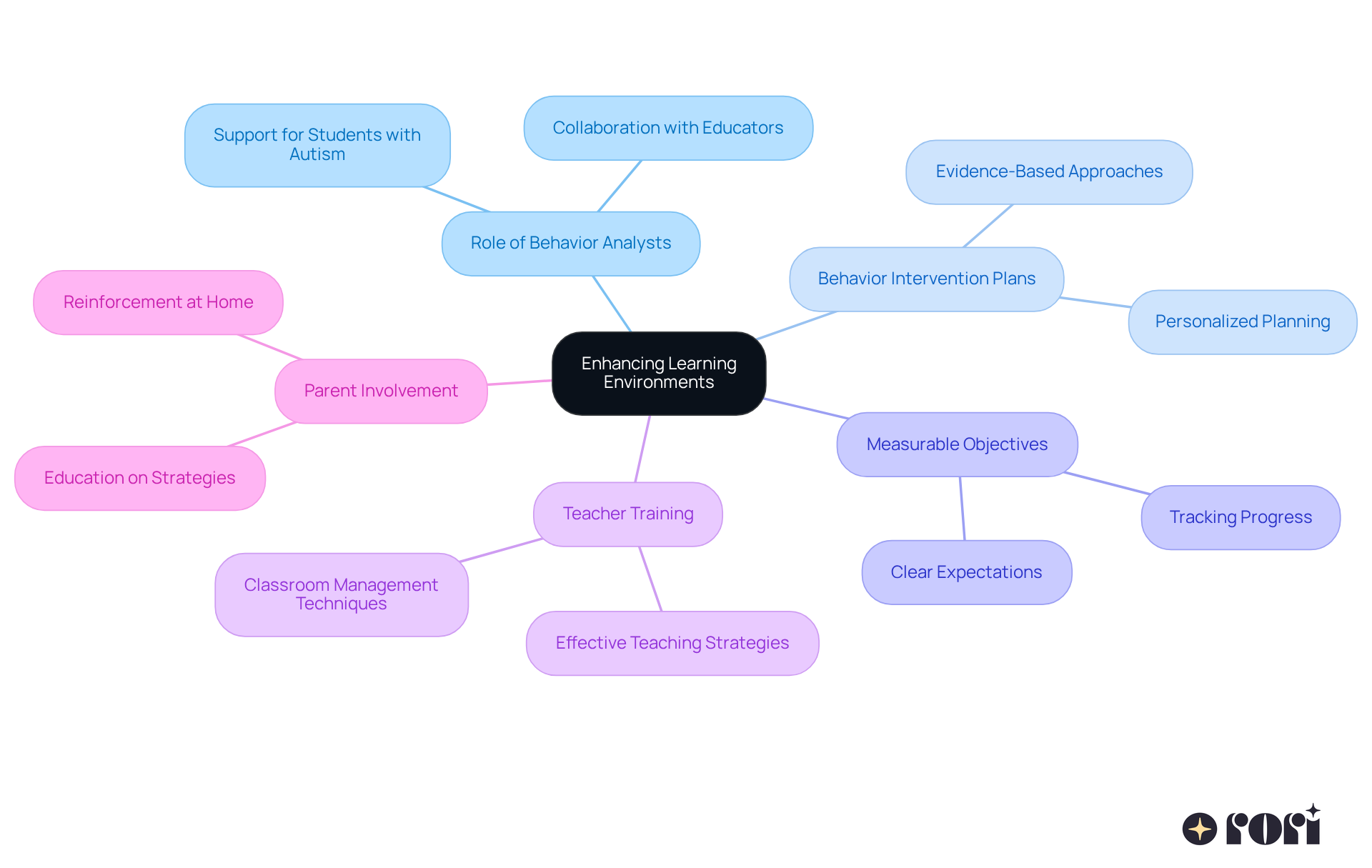
Board Certified Behavior Analysts are becoming increasingly recognized in healthcare settings, working hand in hand with medical professionals to address the behavioral challenges that patients often face. At Rori Care, our dedicated clinicians provide compassionate Applied Behavior Analysis (ABA) support, helping families navigate their unique journeys. These specialists develop tailored strategies to ease anxiety, improve compliance with medical procedures, and enhance overall patient care.
By weaving behavioral analysis into healthcare practices, Board Certified Behavior Analysts play a vital role in crafting more effective treatment plans. This leads to better health outcomes for individuals with autism and other developmental disabilities. As the demand for behavioral strategies in hospitals continues to rise, these experts are key in shaping patient care protocols that balance both behavioral and medical needs.
Their knowledge not only encourages compliance but also enriches the overall experience for patients, ensuring that care remains both compassionate and effective. As industry experts highlight, the growing acknowledgment of ABA's effectiveness is essential for parents searching for impactful interventions for their children. It empowers them with the insights and strategies they need to support their child's development. Let’s explore this together!
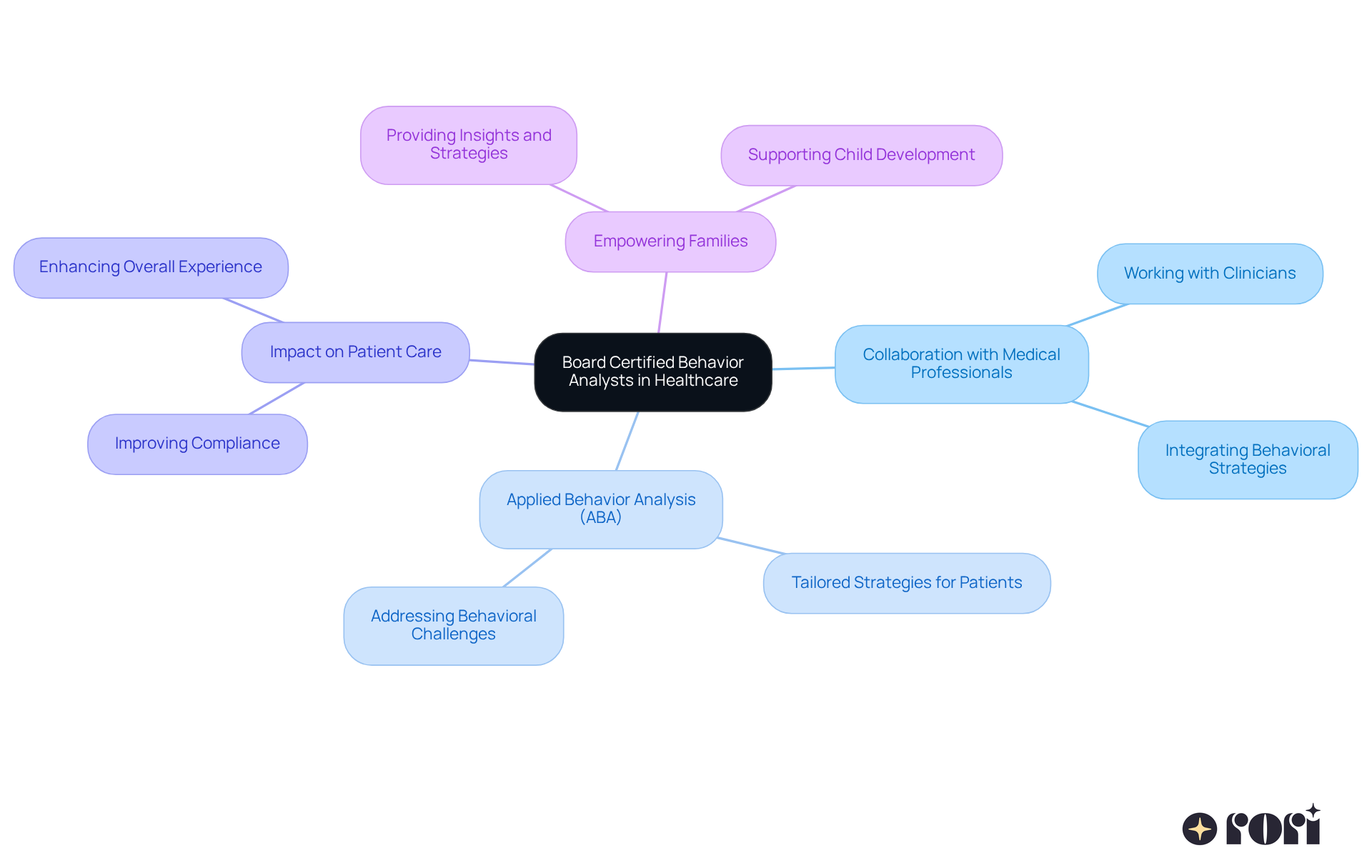
Board Certified Behavior Analysts play a pivotal role in organizational behavior management, using ABA principles to enhance workplace dynamics and boost employee performance. By conducting thorough assessments and implementing targeted training programs, behavior analysts help organizations create a positive work environment. This is essential for increasing productivity and reducing employee turnover.
For instance, companies that have embraced ABA strategies often see a significant rise in employee engagement and satisfaction. In fact, this can lead to a 20% reduction in turnover rates! Isn’t that impressive? This consulting role not only highlights the flexibility of behavior analysts but also showcases where can a BCBA work to drive meaningful change across various professional settings.
Success stories are everywhere, with organizations reporting improved communication and collaboration among teams. This ultimately leads to better overall performance. As the need for effective workplace solutions continues to grow, it is important to understand where can a BCBA work, as their expertise in applying behavioral principles is becoming even more valuable in corporate environments.
By employing personalized planning and setting measurable goals, behavior analysts can tailor their strategies to fit the unique needs of each organization. Plus, evidence-based approaches ensure that interventions are truly effective. And let’s not forget the exciting integration of AI-driven progress report automation! This not only streamlines data collection but also frees up 50% more time for direct engagement with employees. How amazing is that? It really enhances the impact of ABA principles in the workplace. Let’s explore this together!
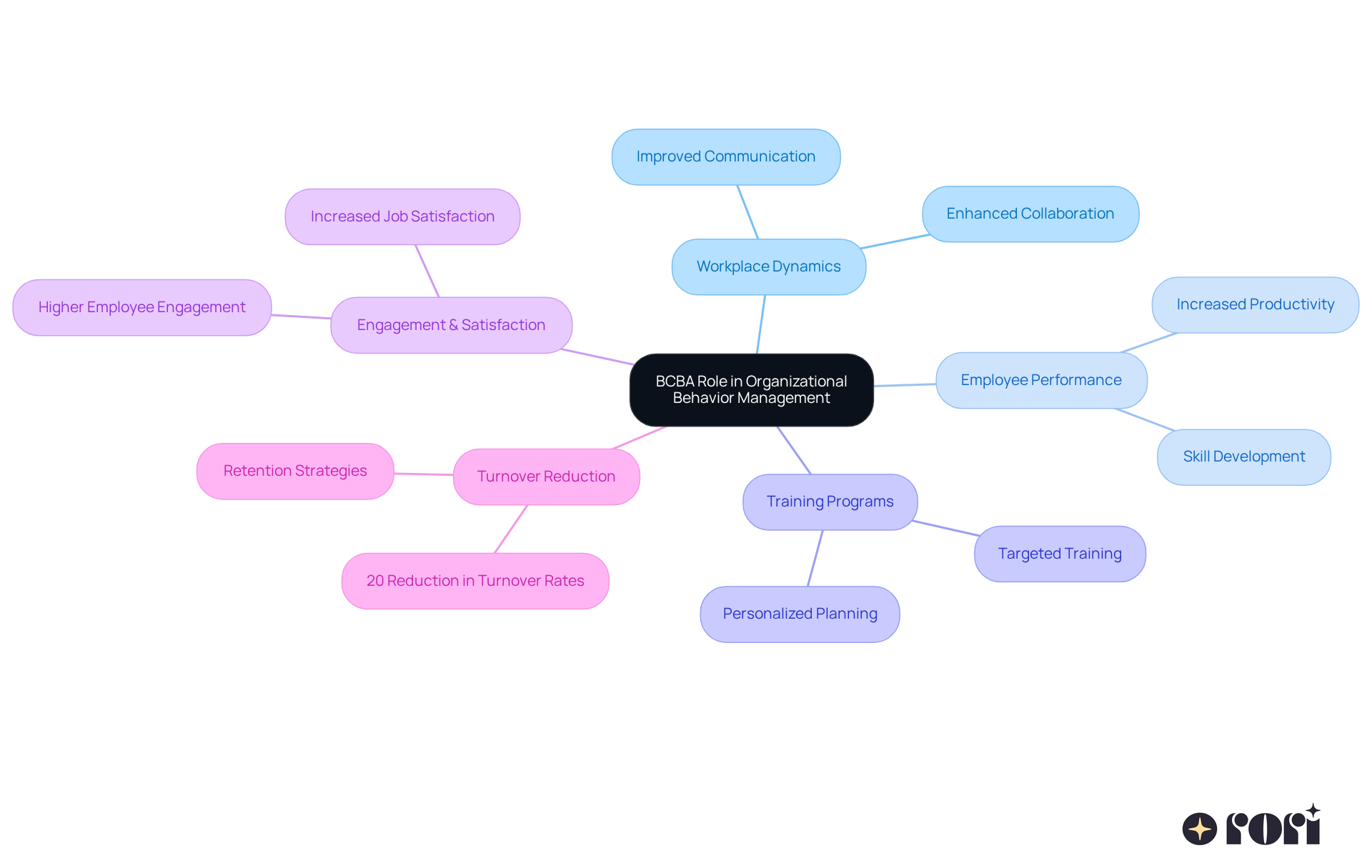
Board Certified Behavior Analysts (BCBAs) play a vital role in the world of behavior analysis, actively engaging in research and academia. They dive into innovative interventions and share their findings, which serve as the foundation for best practices in autism care. By crafting personalized plans with measurable objectives and evidence-informed approaches, BCBAs ensure that interventions are tailored to meet the unique needs of each individual. Their dedication to continuously evaluating and adjusting these plans is key to fostering positive behavior changes and skill development.
Plus, the integration of advanced AI technology in ABA therapy makes things even more exciting! It allows for automatic data collection and progress report generation, freeing up 50% more time for direct care. This efficiency not only enhances the quality of care but also empowers caregivers with ABA principles and strategies. They can actively support their children's behavioral goals through informed decision-making and effective data collection.
By training future behavior analysts and conducting thorough studies, these professionals are essential in expanding our understanding of autism and fine-tuning effective intervention strategies. Their research ensures that interventions are not just evidence-based but also continually evolving to meet the needs of individuals with autism. This commitment to evidence-based practices is crucial, as it leads to successful interventions that enhance communication, social skills, and overall quality of life for children with autism. The ongoing advancements in behavior analysis research in 2025 highlight the importance of board-certified behavior analysts in shaping the future of autism treatment. Let’s explore this together!
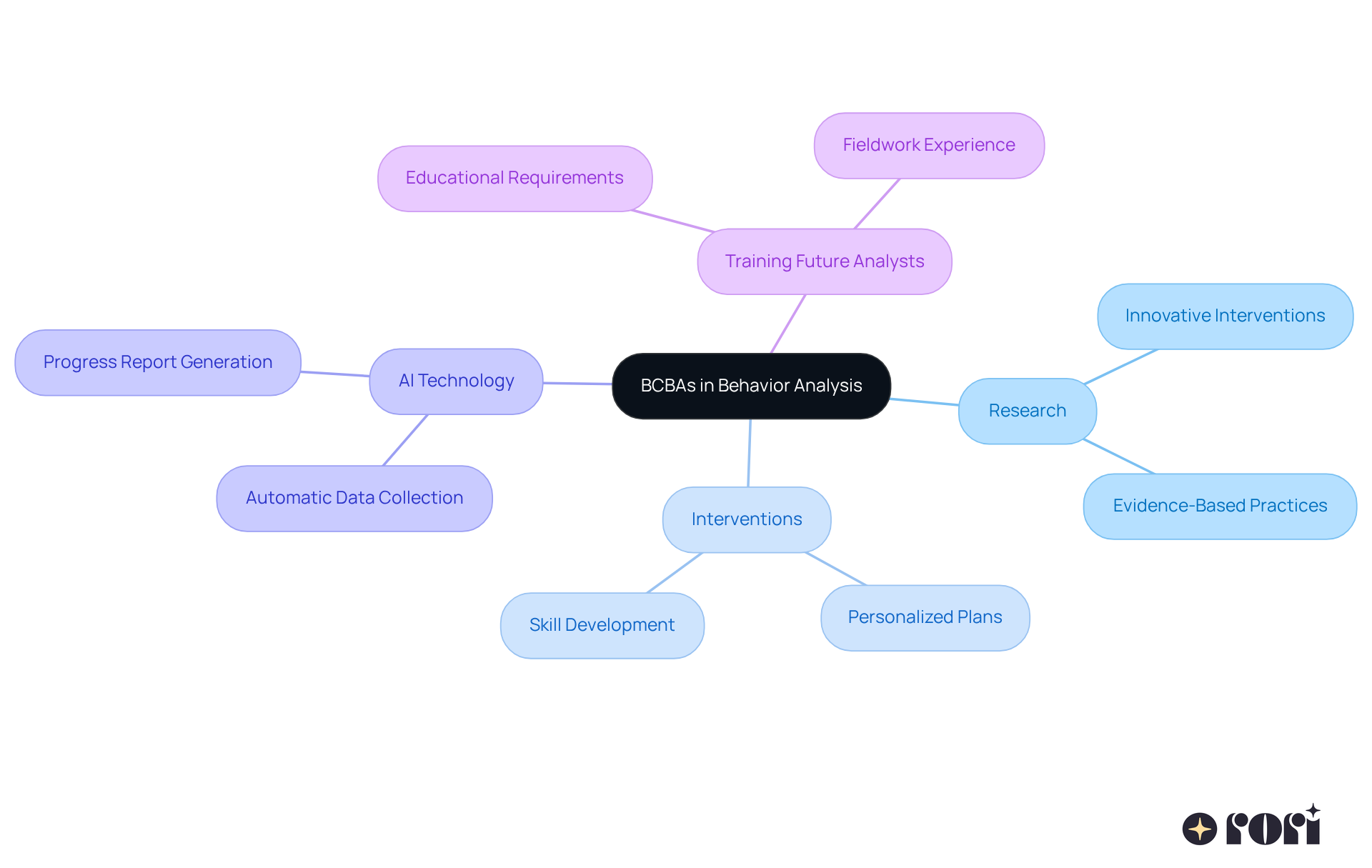
Board Certified Behavior Analysts are truly making a difference in public policy and advocacy! They’re actively working to influence legislation that affects access to ABA services, which is so important for families. By teaming up with various organizations and stakeholders, they’re advocating for essential funding, comprehensive insurance coverage, and the rights of individuals with autism. This advocacy is vital in making sure that effective behavioral interventions are available to those who need them.
Recently, there’s been a push to expand access to ABA therapy, showing a growing recognition of its importance in supporting individuals with autism. Through these collaborative efforts, behavior analysts are enhancing the availability of services and empowering families to access the support they need for meaningful progress. It’s all about guiding families on the payment options available, including insurance-covered therapy that can cover up to 100% of ABA treatment. This assistance helps families overcome financial barriers.
And let’s not forget the role of caregivers! When they are empowered through education on ABA principles and strategies, it significantly enhances behavioral outcomes for children. This creates a collaborative environment that promotes effective and lasting progress. We’re here to help you every step of the way! Let’s explore this together!
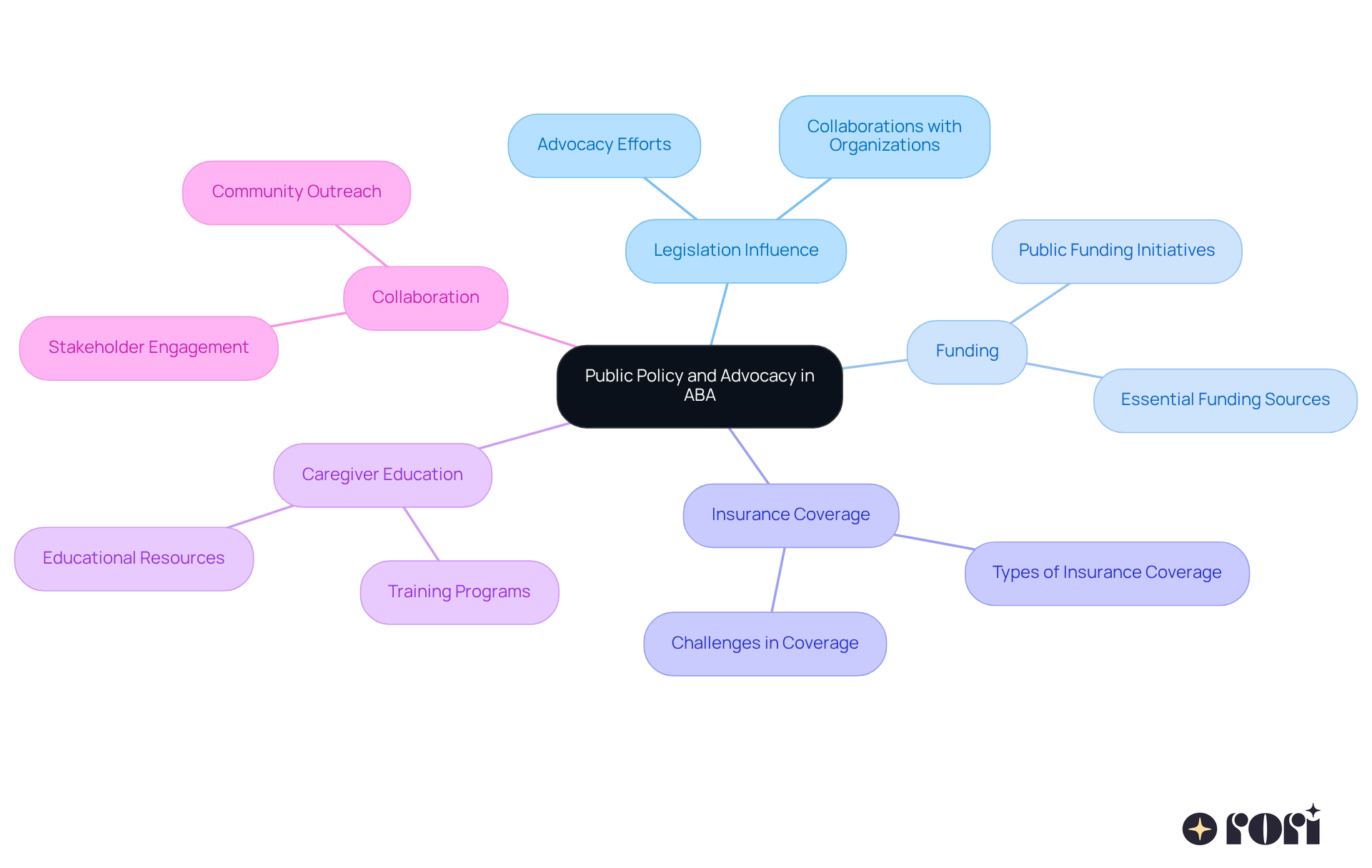
Establishing a private practice is a popular choice for many Board Certified Behavior Analysts, as it represents one of the places where a BCBA can work to provide personalized Applied Behavior Analysis services directly to clients. This entrepreneurial path offers flexibility in service delivery and the opportunity to create a unique practice model tailored just for individual needs. However, launching a private practice comes with its own set of challenges. Behavior analysts need to manage finances wisely, market their services effectively, and navigate the complexities of insurance reimbursement—these are crucial for building a successful practice.
Rori Care is here to help with advice on available payment options, assisting families in covering up to 100% of ABA service expenses. This support is vital for making these essential services more attainable. Additionally, behavior analysts play a key role in conducting functional behavior assessments, designing individualized treatment plans, and monitoring progress—these are all essential aspects of their work. Did you know that significant progress is observed in 90% of children when recommended hours are fully implemented with active caregiver involvement?
The demand for personalized ABA services has increased, raising the question of where a BCBA can work! The number of certified Board Certified Behavior Analysts has dramatically increased from 5,000 in 2013 to 48,000 in 2022. Plus, the estimated job growth rate for Board Certified Behavior Analysts, indicating where a BCBA can work, is 22% over the next decade, reflecting a robust market for specialized care. As behavior analysts step into private practice, they can utilize their expertise to develop effective interventions that greatly enhance the lives of individuals with autism spectrum disorder (ASD) and other behavioral challenges.
By leveraging advanced tools like Rori's behavior care engine, which automates progress report generation, behavior analysts can boost therapy efficiency, freeing up 50% more time for child treatment. Collaboration with families and other professionals is also key—it enhances the effectiveness of interventions and supports the overall well-being of clients. Let’s explore this together! We’re here to help you every step of the way!
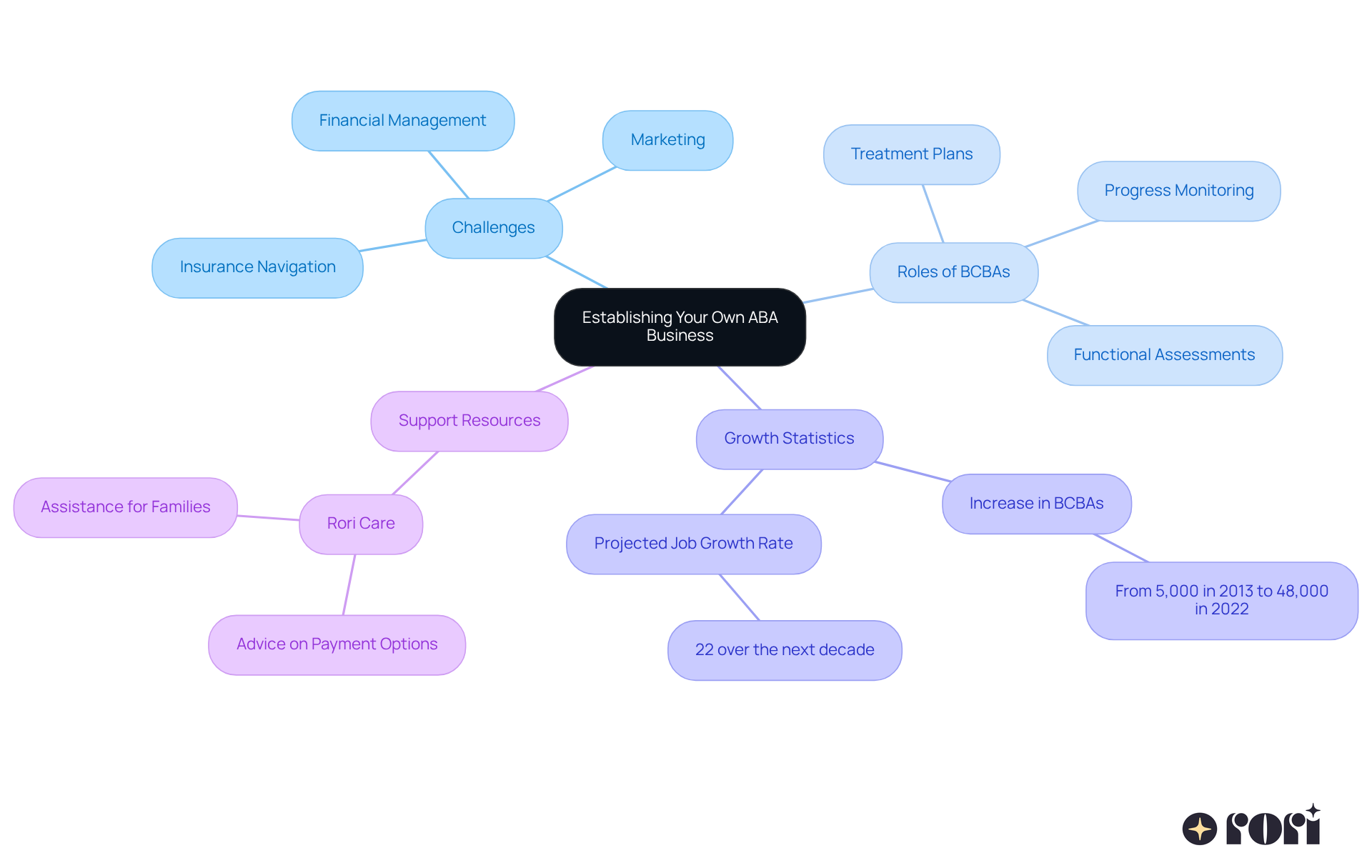
The job outlook for Board Certified Behavior Analysts is looking really bright! With a projected growth rate of 22% over the next decade, there’s a lot to be excited about. This growth is mainly driven by the increasing demand for Applied Behavior Analysis (ABA) services, thanks to a greater awareness of autism and developmental disabilities. Can you believe that the demand for behavior analysts skyrocketed by an incredible 1,942% from 2010 to 2018? That really shows how strong the market need is! As of 2023, there are over 65,000 job postings that require or prefer BCBA certification, which highlights where can a BCBA work and the vast opportunities waiting for you in this field.
Behavioral analysts can look forward to finding rewarding roles in various settings, which raises the question of where can a BCBA work, including:
The adult services sector is particularly booming, with a remarkable growth rate of 28-32% annually. That means even more job opportunities are on the horizon! Plus, the rise of telehealth services is projected to grow impressively at a rate of 25-30% each year, providing behavior analysts with innovative ways to deliver care.
As the world of ABA services evolves, the need for qualified professionals is expected to stay strong. It’s truly an exciting time to dive into a career in behavior analysis! With the ongoing recognition of ABA's effectiveness in addressing behavioral challenges, certified behavior analysts are in a fantastic position to make a real difference in people’s lives and contribute positively to their communities. Let’s explore this together!

Board Certified Behavior Analysts (BCBAs) have a fantastic array of career opportunities, raising the question of where can a BCBA work across various sectors such as clinical practice, education, research, and corporate consulting. This versatility means you can explore where can a BCBA work that truly resonates with your personal interests and strengths—whether you love direct client interaction, teaching, or diving into organizational consulting.
For example, in clinical settings, BCBAs work closely with children with autism, implementing individualized therapy plans that can make a real difference. In schools, they create programs that help enhance social skills and adaptive behaviors, making learning more accessible and enjoyable. And in the corporate world, their expertise can transform workplace dynamics and improve employee training programs.
This adaptability not only boosts job satisfaction but also makes BCBA certification a valuable asset in today’s competitive job market. With the demand for BCBAs projected to grow by 22% over the next decade, professionals in this field should consider where can a BCBA work to find fulfilling opportunities that align with their unique skills and passions. Let’s explore this together and see how a career in behavior analysis might be the perfect fit for you!

The transformative impact of Board Certified Behavior Analysts (BCBAs) is truly remarkable, showcasing the diverse opportunities available in various sectors. Whether in clinical practice, education, healthcare, or corporate consulting, BCBAs play a vital role in enhancing the lives of individuals with autism and other developmental disabilities. Their knack for creating personalized interventions and using data-driven strategies not only boosts individual outcomes but also nurtures greater independence and social integration.
Throughout this article, we've uncovered key insights about the effectiveness of ABA therapy in different settings. For example, early intervention can lead to significant improvements in communication and adaptive behaviors. Plus, integrating advanced technology helps streamline care processes, allowing more time for meaningful engagement with clients. And let’s not forget, the growing demand for BCBAs—projected to increase by 22% over the next decade—highlights the importance of their work in shaping future opportunities and advancing practices in the field.
As the landscape of behavior analysis continues to change, the call to action for aspiring BCBAs is clear: let’s explore the various roles available and think about how you can leverage your skills to make a meaningful difference. Whether you’re drawn to private practice, educational institutions, or healthcare settings, the potential to transform lives through effective behavioral interventions is immense! Embracing this journey not only enriches your personal career path but also significantly contributes to the well-being of individuals and families who need support. We’re here to help you every step of the way!
What is Rori Care's approach to ABA therapy?
Rori Care employs a data-driven strategy to tailor each care plan to meet the unique needs of every child, utilizing advanced technology for automated data collection and analytics to inform interventions.
How does Rori Care enhance the efficiency of ABA therapy?
Rori Care's behavior care engine automates progress report creation and securely stores data, allowing caregivers to focus 50% more time on direct youth care.
What are the benefits of intensive ABA interventions for children with autism?
Studies show that intensive ABA interventions can reduce severe behaviors by up to 90% and improve language skills significantly, with an average effect size of 9.02.
What role do Board Certified Behavior Analysts (BCBAs) play in clinical practice?
BCBAs create personalized treatment plans for individuals with autism and developmental disabilities, conducting assessments to track progress and adjust interventions accordingly.
Why is early intervention important for children with autism?
Early intervention, particularly before age four, tends to lead to better long-term outcomes, including significant improvements in communication skills and adaptive behavior.
What challenges do families face regarding access to ABA therapy?
Only 15% of insured youths referred for ABA-based behavioral health care receive 80% or more of the recommended therapy hours, indicating accessibility challenges.
How do behavior analysts support educational environments for students with autism?
Behavior analysts collaborate with teachers to develop tailored behavior intervention plans, establish clear objectives, and provide training on effective teaching strategies and classroom management.
What is the importance of involving parents in the ABA therapy process?
Educating families about strategies to reinforce interventions at home enhances support and informed decision-making for their child's development.